Soon after the Centre stripped the autonomy of Jammu & Kashmir in 2019, Arfa Khanum Sherwani took out a trip to the Valley and brought out video stories on human rights abuses and the suppression of civil and political rights for The Wire, India’s most trusted, financially and editorially independent multimedia news website.
A year later, in 2020, she covered the protests against the Citizenship Amendment Act and the farmers’ protests extensively even as the mainstream media continued to demonise the mass movements. Her reports from Delhi, Uttar Pradesh and Haryana reached millions of viewers and amplified the genuine voices of the protesters.
In the process, she became a thorn in the flesh of the Hindutva ecosystem that relies completely on fake news and hatred against religious minorities. Not surprisingly, Arfa soon became one of the prime targets of the right-wingers, who unleashed fake auctions online - Sulli Deals and Bulli Bai in 2021 and 2022, respectively - to denigrate Muslim women . The incidents revealed how technology is being used to put women at risk through online abuse, theft of privacy or sexual exploitation.
“Until 2020, I lived in anxiety because of online bullying and trolling. Now, there is a real possibility that the people in power want to send me (and all public voices like me) to jail. It is the biggest cause of my anxiety now,” she said in this special interview for Vartha Bharathi’s anniversary issue.
Arfa dwelled on her entry into journalism, career progression, dealing with online abuses, and the reasons for the downslide of Indian journalism in this interview.
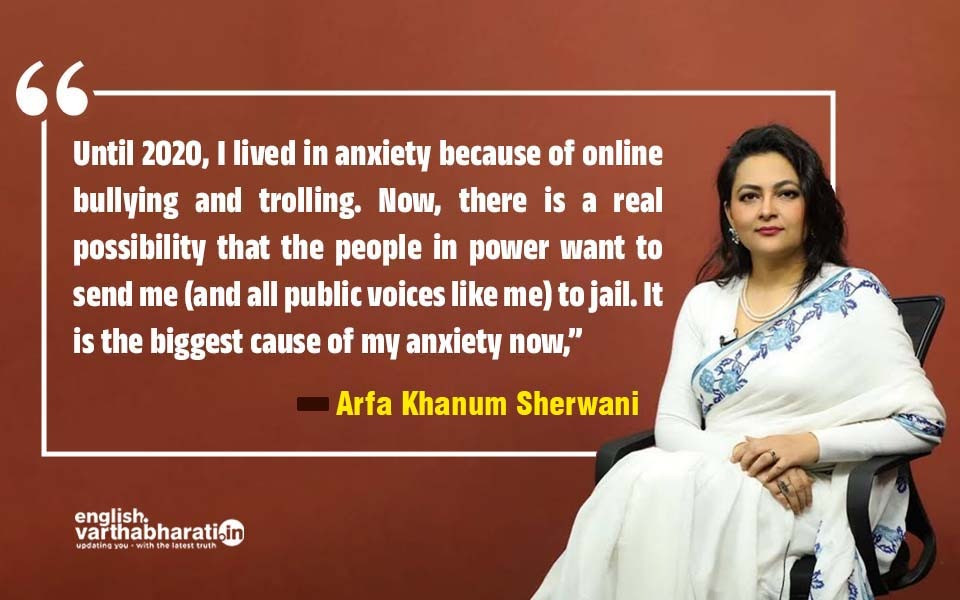
Edited excerpts.
Q: You are one of the aggressive and fearless journalists in India. What made you a journalist in the first place? Could you please tell us about your career so far?
I hail from a small town in Uttar Pradesh. I have had a flair for writing since my childhood. I was the editor of my college magazine. I always wanted to listen and tell people's stories. I noticed that people from the marginalised communities, especially the religious minorities and women, did not have a voice and they faced a lot of inequality, suppression and injustice.
When I was growing up in the 80s and 90s, the Hindutva wave was sweeping across Uttar Pradesh and people from marginalised communities and women had no representation in the mainstream media. So I thought I should do something for them. Then I did a journalism course from the Aligarh Muslim University and came to Delhi. I did internships with a couple of English dailies, but soon I realised that television was my calling. I joined Sahara TV in the early 2000. They had a few news bulletins at that time. Soon there was an expansion of TV news channels. Fortunately, I was one of those first people to get a full-time job in TV news channels. NDTV hired me in 2003 and I worked for them for several years before I joined Amir Khan's programme Satyamev Jayate’s Season One. From there to Rajya Sabha TV and to The Wire.
How do you get the courage to take on the powers-that-be?
I am representing more than 80 percent of the marginalised sections of Indian society, such as labourers, farmers, women, religious minorities and those who are not part of the mainstream political outfits and mainstream news. When I go out and talk to them, I feel their issues are not addressed at all. It gives me courage to raise issues.
While you do that kind of journalism, you face a lot of bullying and a lot of abuse almost every day. ‘Bulli Bai’ and ‘Sulli Deals’ are just two cases in point. How do you deal with these abuses?
It's a difficult question. Until 2020, I lived in anxiety because of online bullying and trolling. Now, there is a real possibility that the people in power want to send me (and all public voices like me) to jail. It is the biggest cause of my anxiety now.
Do you think your name is the reason for people to vilify you?
People who vilify me do not like journalists who ask questions. Another reason for their hate towards me is my religion. When I am trolled and attacked online, it is not just because of what I do, but because of my identity, too. They focus on my religious identity to tell people - especially non-Muslims - that she is not a journalist, and that she is just another Muslim who opposes a Hindu prime minister. They try to discredit me and nullify the impact of my work.
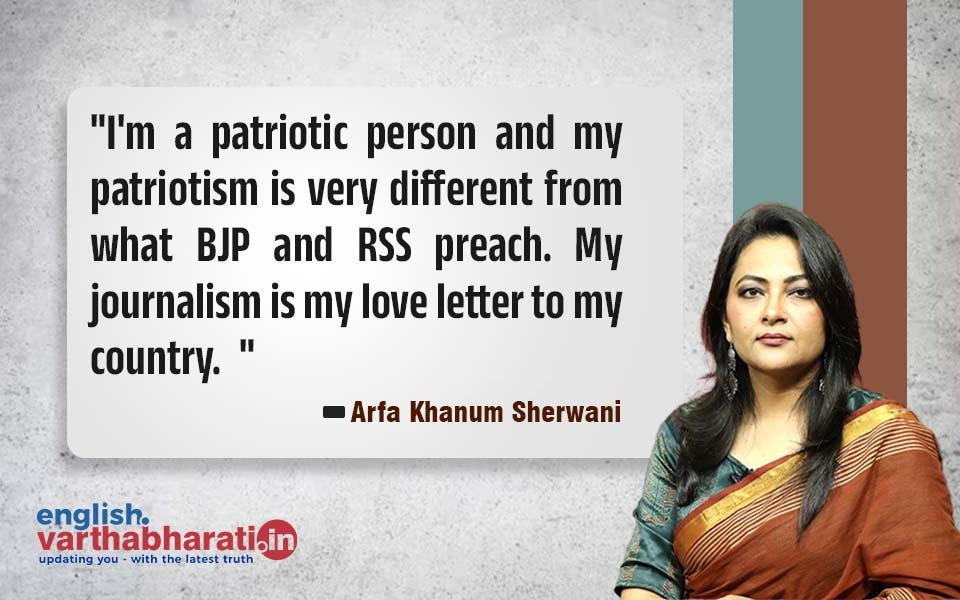
You've been a journalist for the last 23 years. So you have seen the slow death of responsible journalism. What do you think are the reasons for this downslide?
It's an important question. When people call me brave, I tell them that there is nothing unusual in it. Because I have been doing this job for the past 23 years, including the past nine years since Narendra Modi became the prime minister. Vartha Bharati readers would be surprised to know that I had worked for Rajya Sabha TV and I even criticised many policies of the government at that point in time. The government never censored my work. I'm one of those fortunate people who worked for a supposedly government-owned news organisation and freely criticised the government of the day.
Contrast it with the current scenario. Many journalists who used to question the Congress-led government have completely turned pliant now. There are three reasons for this shift. One, the Indian media has always been dominated by the upper caste, and a majority of them are aligned with the ideology of the RSS and BJP. They apparently practised journalism when the Congress was in power. I am particularly talking about the Hindi newsrooms because I have had the experience of working in Hindi TV newsrooms, which are the most dominant media right now. They are communal, casteist, anti-women and anti-poor. After the Modi government came to power, a happy marriage between the media and the government happened because of this ideological affinity.
The second reason is that the current regime is vindictive and it does not like journalists who ask questions. It created an element of fear among journalists.
The third reason is greed. Right now the top editorial appointments in the Hindi TV newsrooms are political. Those preferred by people in power would become the chief editors, CEOs and the faces of TV news. Quality of the journalists is not a criterion at all. People are being rewarded for aligning with the government. I'm saying this with full confidence.
A Hindutva state is not possible without having a Hindutva media at the centre of the discourse. Journalists who are supposed to be accountable to people have actually become voices of the government. They have become the footsoldiers of the Hindutva ideology of the RSS and BJP.
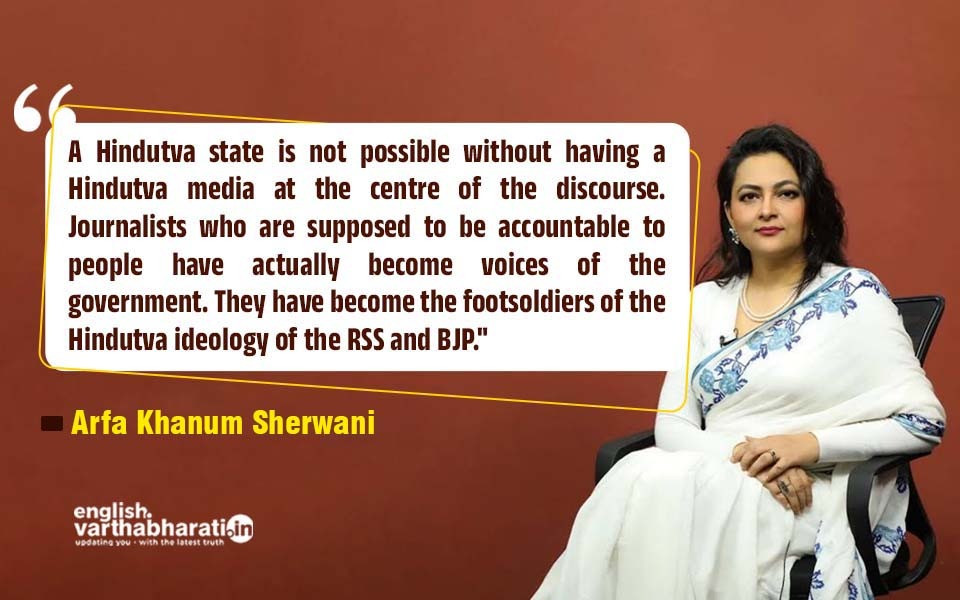
We are also seeing the popularity of outright Hindutva media, such as Suresh Chavanke’s Sudarshan TV…
That's true. Actually, the competition currently is between outright bigoted right-wing channels and so-called mainstream channels on who will surpass who in terms of peddling fake news and anti-Muslim, anti-Christian agenda. They even target South India. For example, they have been demonising Kerala to an extent that their viewers may think that the state is not part of India and it is governed by different laws. Recently, a mainstream TV news channel reported that Kerala did not celebrate Diwali because Hindus were a minority.
Journalists like you have been consistently exposing this authoritarian regime. But we can't see any change happening on the ground. Do you agree with that?
No, I disagree. When I go out and meet people, I realise the influence wielded by a small news organisation like The Wire on the people. Villagers tell me that they watch my programmes in Hindi. It shows that people differentiate between the pliant mainstream media and the objective alternate media.
Will Indian journalism retrieve its old glory?
Right now in India, there are hundreds of thousands of journalists. There are hundreds of news channels, there are thousands of newspapers, and still the government spends all its energy and resources to stop the flow of information to people. TV channels are not working to inform the people. This is where the role of people like me comes in. We are trying to reach out to this audience. I am not on TV, I am not even in the newspaper. But people literally search for The Wire and watch my programmes. Because they consider The Wire and me as credible voices. It's the greatest reward a journalist can ask for.
You were awarded the Chhatrapati Samman in 2023. You dedicated the award to Palestinian journalists…
When I see more than 50 journalists dying in the line of duty in Palestine, it breaks my heart. My heart bleeds for them. And the least I can do is to dedicate that award to them. When I do that, I highlight the cause of Palestine and Palestinian people.
Finally, what's your advice to the upcoming journalists?
I'm a patriotic person and my patriotism is very different from what BJP and RSS preach. My journalism is my love letter to my country. I think we need more and more journalists now who are committed to telling stories and would go that extra mile and contribute to nation building.
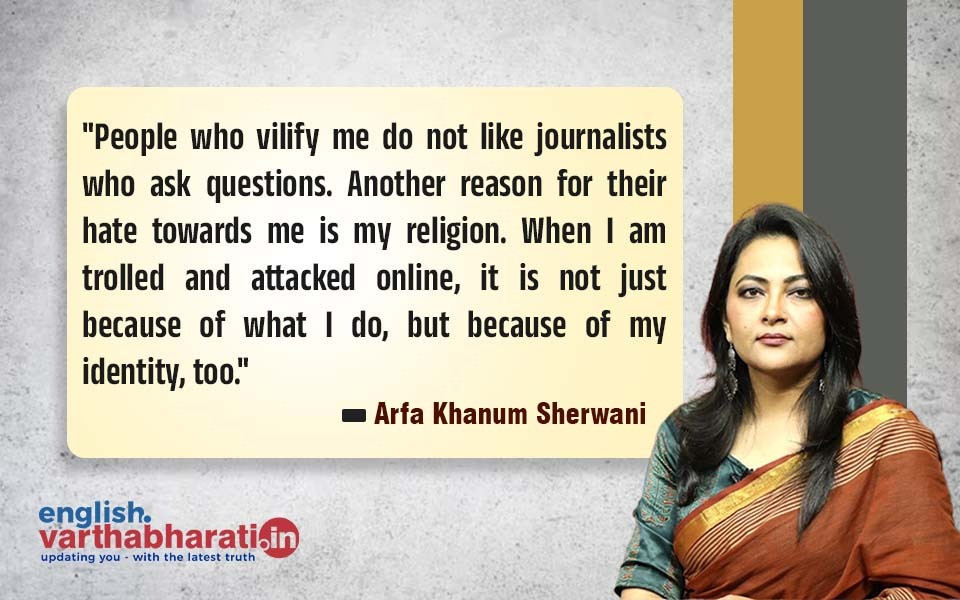
Let the Truth be known. If you read VB and like VB, please be a VB Supporter and Help us deliver the Truth to one and all.
Bengaluru (PTI): Karnataka Minister M B Patil on Tuesday chaired meetings with industry representatives from the aerospace and defence, machine tools, auto/EV, and green energy sectors to discuss sector growth and government support measures.
The meetings were attended by leading industrialists and their representatives, with some participating virtually.
Speaking on the occasion, the minister for Large and Medium Industries said Karnataka is at the forefront of the country’s aerospace and defence sectors.
He noted that Suzuki and Toyota plan to launch aerial taxi services in Japan by 2028, with Bengaluru-based Sasmos supplying electrical equipment for the project.
Industrialists suggested introducing similar “fly-taxi” services in Karnataka through an appropriate policy, which Patil said would be examined seriously.
The minister highlighted the need to establish testing centres and Common Facility Centres for the aerospace and defence industries and assured that these facilities would be provided.
Suggestions were also made to prepare a comprehensive roadmap for sector growth.
Karnataka has urged the Central Government to approve Defence Corridor projects in the Bengaluru North–Kolar–Chikkaballapur and Dharawada–Vijayapura–Belagavi regions.
Industrialists also suggested a corridor between Bengaluru and Mysuru, Patil said.
He said Karnataka aims to become a hub for defence electronics manufacturing, with plans to establish a 200-acre Defence Electronics Park and a 100-acre Avionics and Sensor Park.
These projects will be implemented once the Special Investment Region is operational, and land availability will not be an issue.
On the machine tools sector, Patil said the industry has recorded an annual turnover of Rs 36,500 crore and is witnessing steady growth.
Large-scale exhibitions have increased demand, and the state must strengthen its capabilities to develop control systems for heavy machinery. One testing unit is already operational in Bengaluru, with another planned for Tumakuru. Expansion of vocational training institutes in industrial areas is also underway.
In the Auto and EV sector, Vision Group members highlighted the need for a network of dry ports and more EV charging stations across the state.
Patil noted that the Tata Group is manufacturing EV buses in Dharawada for nationwide supply. Plans for mini excavator production and export facilitation were also discussed, along with the establishment of a testing facility for two-wheeler EVs.
For the Green Energy sector, the group emphasised the need for a suitable policy on battery-based energy storage and the establishment of data centres.
Patil assured that the government will seriously consider all suggestions and respond positively.

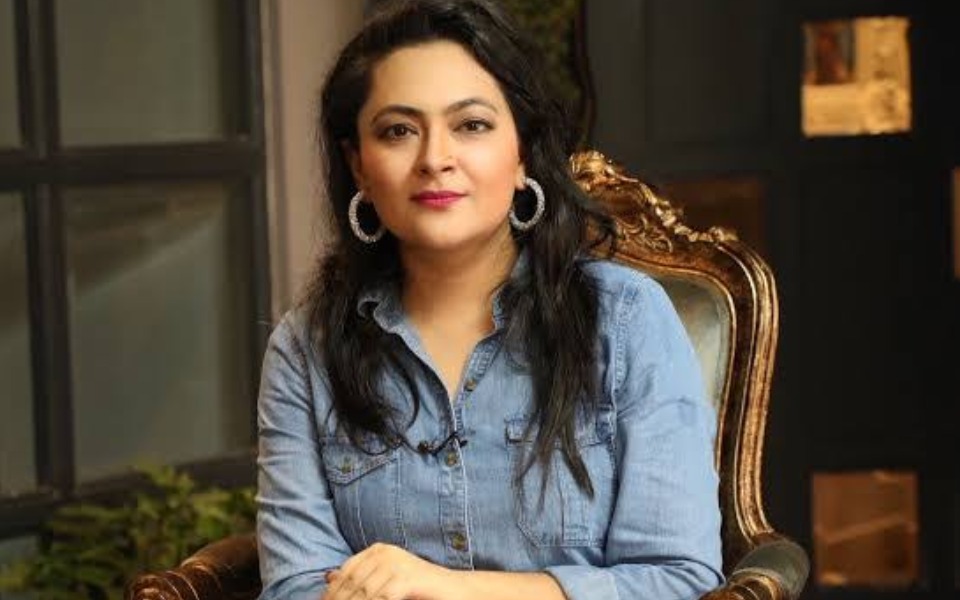
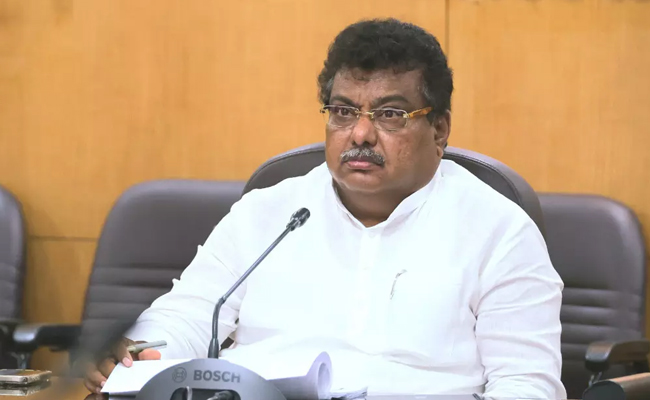
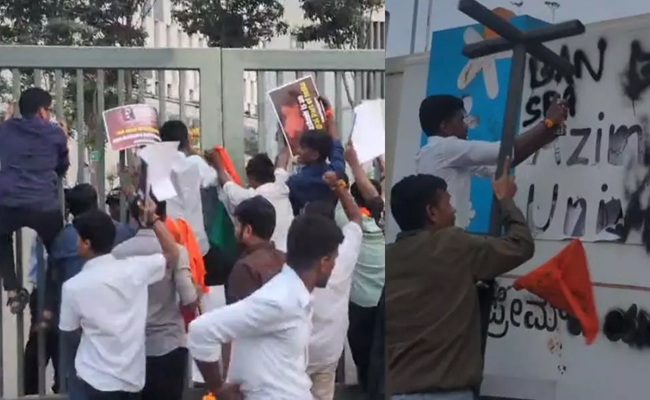
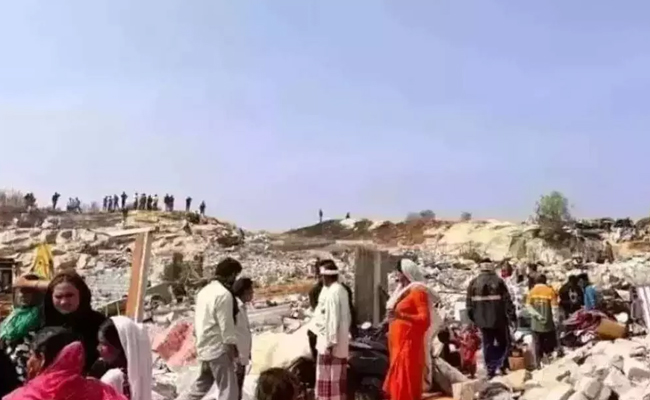
_vb_21.jpeg)